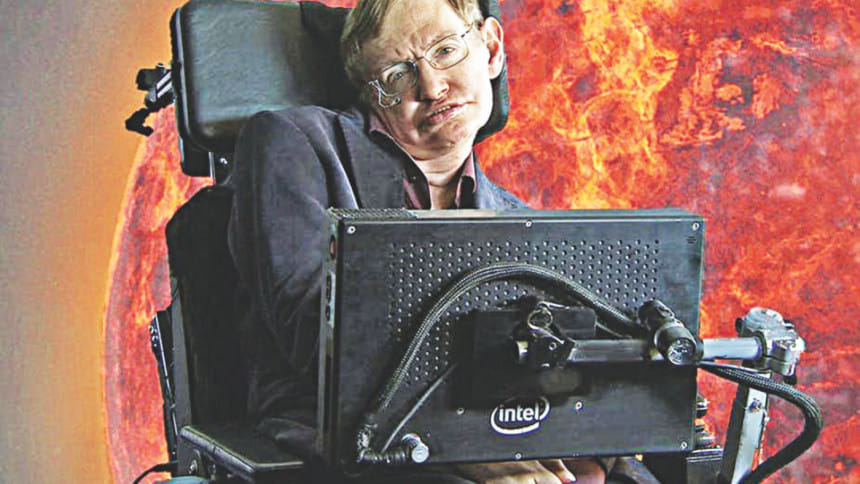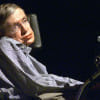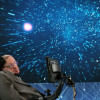Stephen Hawking's unparalleled legacy

The world-famous physicist Stephen Hawking passed away on March 14, 2018. His death has left me saddened like millions around the world. But I was happy to see that The Daily Star had published a couple of articles on Stephen Hawking, one of which was written by a Bangladeshi academic. It inspired me to express my thoughts and feelings about how Hawking's work has influenced me.
Reading Hawking's most famous book, A Brief History of Time, made me realise the sheer vastness of the universe. The book took me through a wonderful, eye-opening journey—giving me insight into the creation of the universe. Published in 1988, A Brief History of Time was the Sunday Times' bestseller for 237 weeks. In the book, Hawking talks about the history of physics, gravity, how light moves in the universe, space and time, elementary particles (such as quarks, which are very small objects that make up things in the universe), black holes, the Big Bang (the theory that the universe was created from a single point), and time travel. At the time, the book was groundbreaking in more ways than one, including the fact that it put complex subjects in simple words for laymen like me.
Hawking introduced us to the ideas of philosophers such as Aristotle and Ptolemy. Aristotle had figured out that the earth is round. He also thought that the sun and stars went around the earth. Ptolemy too thought about how the sun and stars were located in the universe. Ptolemy made a planetary design that described Aristotle's thought. But today, it is known that the opposite is true: the earth goes around the sun. The Aristotle-Ptolemy ideas about the position of the stars and sun were disproved in 1609. The person who first thought of the idea about the earth going around the sun was Nicolaus Copernicus. Around that time Galileo and Johannes Kepler, two other scientists, also helped to prove that Copernicus' idea was right. They looked at how the moons of some planets moved in the sky, and they used this movement to prove Copernicus right. Isaac Newton also wrote a book about gravity, which helped to prove Copernicus' idea.
The origin of the universe represented another great topic of scholarly exercise debate over centuries. Early philosophers like Aristotle thought that the universe had existed forever, while theologians such as St Augustine believed it was created at a specific time. St Augustine also believed that time was a concept that was born with the creation of the universe—a belief that has been articulated in religious books.
Very interestingly, in 1929, astronomer Edwin Hubble discovered that galaxies are moving away from each other. That means, there was a time, between 10 and 20 billion years ago, when they were all together in one single extremely dense place with infinite gravity. This discovery brought the concept of the beginning of the universe and time through the Big Bang in the realm of science—which some religious books had said long ago.
How the universe started and how it might end is explained by the Big Bang theory. Most scientists now believe that the universe began in a sudden explosion—called the Big Bang—of the dense egg-shaped mass. The model for this is called the "Hot Big Bang model". When the universe started getting bigger, the things inside it also began to get cooler. When the universe was first created, it was infinitely hot. The temperature of the universe cooled and the matter inside the universe began to clump together.
Hawking also proved that the universe is ever-expanding and it is getting bigger day by day—very similar to the idea mentioned in the Qur'an. Most interestingly, it has no frontier and the density of the ever-expending universe is going lower with the passage of time. Hawking also talked about how the universe could have been. For example, if the universe formed and then collapsed quickly, there would not have been enough time for life to form. Another example would be a universe that expanded too quickly. If a universe expanded too quickly, it would become almost empty. But the universe is expanding in a manner such that life can exist, at least for a certain period of time. Interestingly, the Big Bang has generated the idea that the universe will one day come back to its original shape through a "Big Crunch". This whole idea of expansion and crunch is articulated in religious books.
In the beginning of the nineteenth century scientists became convinced that the universe's structure and evolution could eventually be precisely explained by a set of laws. However, the origin of these laws was left in the domain of God. The Big Bang implied by the general theory of relativity of Albert Einstein indicates that a creator of the universe or God has absolute freedom to choose the origin and all the laws of the universe. According to Einstein, time is relative and flexible, and "the dividing line between past and present, and the future is an illusion." So, reality is ultimately timeless...
Stephen Hawking's work has influenced millions around the globe, and ignited an interest in the minds of many about the origins of the universe. When he was diagnosed with a motor neurone disease at the age of 21, Stephen Hawking was given two years to live but he went on to live to the age of 76. We may have lost his presence but science's biggest star since Einstein has left behind an unparalleled legacy.
Shazzad Khan is a cosmology enthusiast and is a development worker working at Manusher Jonno Foundation (MJF).
Email: [email protected]










Comments